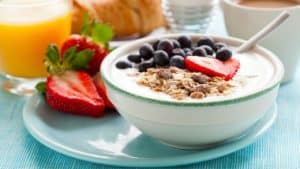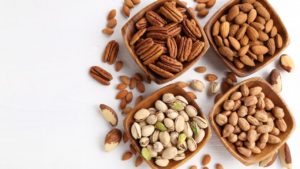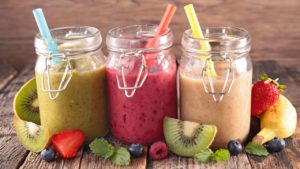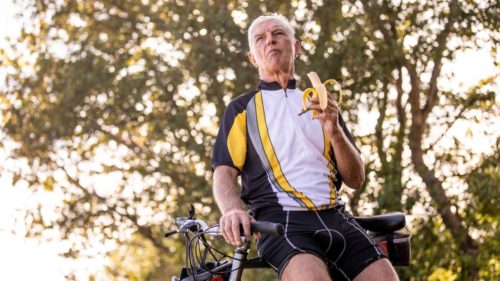Proteins are an essential part of working out, no matter what the exercise actually is. For a lot of cyclists, they know that they need to get not only their daily requirement, but more to stay healthy, build strong muscles, and take their riding to the next level.
To figure out the ins and outs of protein and riding bikes, it is important to do a good amount of research. This article aims to go over what protein is, how much protein is necessary, how riders can get it, and other tips related to healthy eating.
By the end, people should be able to piece together what they need to do individually to start consuming more protein and increasing their ability to be the best cyclist possible.q
What Is Protein?

Protein is a macronutrient that helps with building muscle mass in the body. Most people know that it is pretty easy to find in animal products, but it is also available in nuts, legumes, dairy products, grains, and beans.
They are one of three macronutrients, with the others being fats and carbohydrates. All of them provide energy to the body, and are needed for cyclists to perform at a high level.
Protein makes up roughly 15% of a person’s body weight. Because it is so important, people should look to get close to 1/3 of the daily calories from some sort of protein. The more a person works out, the more protein they need. Source
How Much Protein Do Cyclists Need?
On average, a person should look to consume .5 to .6 g of protein per pound of body weight. As an example, a rider who weighs 175 pounds should be looking for 87-102 grams of protein per day.
Out of that ratio, about 1/4 of the protein should come right after a ride within the first hour.
The goal should always be to look for lean sources of protein when possible. That can mean lean meats, reduce fat dairy products, nuts, and more.
Most cyclists are going to opt for a lot of smaller meals during the day, instead of opting to load up. Not only does that help with metabolism, but it prevents a rider from feeling like they are bloated at any point.
What Are The Best Sources Of Protein For Cyclists?

Cyclists have plenty of options when it comes to protein. No matter what time of day, there are plenty of foods that are easy to prepare, and they fit just about any diet.
This is more of a general list, but most will find a few foods that work for them to start building meals off of.
Breakfast
Eggs, toast, cereal, milk, yogurt
Lunch
Lean meats, milk, eggs, salad, yogurt, nuts, beans
Dinner
Lean meats, beans, lentils, milk, yogurt, cottage cheese, soba noodles
Snacks
Whey protein drinks, soy protein drinks, skim milk, beef jerky, peanut butter, nuts, protein bars
Are Protein Shakes And Bars Worth It?

There is an entire industry built around protein shakes and bars for people to take advantage of. While they do work from time to time, many doctors recommend not relying on them on a daily basis.
That is because the protein that is picked up from natural food options are usually a little bit healthier overall.
These bars and shakes are loaded with other ingredients that might not be so healthy, so it turns into more of a dessert than something that truly helps.
With that being said, they are very convenient to grab and go when necessary. For cyclists who are looking for something to eat when they are in the middle of a ride, they are likely going to have something like this on their side. It is definitely beneficial for anyone who has a pretty busy schedule.
The Benefits Of Protein Beyond Cycling
Protein is very beneficial for all individuals, and it goes well beyond cycling. While some of these qualities do indirectly connect to cycling in general, it can help the average individual just as much.
Fewer Calories Needed
When protein is added to any type of meal or snack, it can cause a person to need fewer calories. It is pretty amazing what some nuts can do, or a little bit of fruit to avoid eating too many calories in one day.
The way it works is that protein is able to take the edge off of a person’s appetite. It is able to help release hormones that will signal a feeling of fullness that a lot of people do not get naturally.
When there is less of a need to consume calories, the calories stay lower in general.
It is true that eating too many protein options will definitely ruin this benefit, but most people are not going to sit there and eat a ton of nuts or other snacks with protein at a time.
Some small steps by eating more protein will start to add up, and it will save a person a few hundred calories if they start doing it for every meal.
Cravings
When a person consumes something that is high in carbohydrates to the point that it spikes blood sugar, it can eventually cause a dip.
When it happens, people start to have a craving for more sugary foods, and that is when a person can really get in trouble with cravings.
Try to regulate blood sugar as much as possible by eating smaller portions of carbohydrates, instead focusing on protein as well.
It will eventually make a person feel much fuller in general, which is always going to be a huge positive for those who have struggled.
Faster Metabolism During Sleep
Who would not like to burn more calories when they are simply sleeping? Protein can help with that, as it does not just stop at burning calories during the day.
A person does not have to commit to a huge increase in protein either to see some results. While it is not going to burn a ton of calories overnight, it will be one of those steady benefits that start to show after weeks and even months at a time.
Proteins Keep People Slim
Whether a person wants to stay slim to look a certain way, or they are focusing on cutting as much weight as possible for cycling, it is nice to know that protein is not going to pack on extra weight.
The reason why some bodybuilders who consume a lot of protein put on weight is because they also consume a lot of calories. That is the only way a person can find themselves in trouble with protein.
Lean muscle is definitely beneficial for cyclists, and protein helps with that tremendously. One of the great things is that with a diet high in protein, people, in general, have a better understanding of what they can and can’t control.
What Other Nutrients And Essentials Are Important For Cyclists?
Protein is a major nutrient that every single cyclist should be relying on as much as possible, but there are others out there that make a big difference as well.
These are a few other nutrients that cyclists need to have as healthy of a body as possible.
Carbohydrates
There is a lot of hate around carbohydrates because of what they can do if someone consumes too many, or the wrong type.
However, when going on long rides nearly every day, carbohydrates are going to provide a lot of fuel for the body to power through the tougher situations.
Without carbohydrates, a person is going to find that they do not have the energy to push through rides and reach their cycling goals.
Many people who ride bikes, run, or do other types of cardio are going to make sure that they have carbohydrates before and after workouts.
It is much easier said than done, but try to stay away from bad carbohydrates as much as possible. Some of the worst foods out there are filled with carbohydrates, and that is going to cause the body to feel bloated and eventually crash in some instances.
It is the last thing any cyclist wants to have to deal with, as the body will find it tougher and tougher to rebound as time goes on.
Healthy Fats
Consuming healthy fats is a great way for athletes to stay healthy in their own right. For cycling, they help a lot with performance, as well as maintaining weight the right way.
Most people are trying to stay at a certain weight so that they can continue to bike at a high level, and the only way they can do that is with a balanced diet.
Healthy fats mostly come from nuts, fish, oils, and more. They also help reduce inflammation in the body, which is definitely a positive for people who might be bouncing back from injury.
Not too many people initially think of healthy fats as being necessary, but it will help create a more well-rounded diet for cyclists.
Vitamins And Minerals
Keeping up with quality vitamins and minerals can really provide cyclists with a balanced body that will perform well each and every day. It will keep the body strong, powerful, and ready to take on all the different challenges that they face.
Most people are going to get the majority of their vitamins and minerals naturally from the diet that they are eating. As long as they are eating healthy, there will not be much of a need to supplement the diet with a ton of vitamins.
However, there are daily options for people who might have some level of deficiency. Try to look for multivitamin options to cut down on the amount that is taken each day. It can get pretty tedious to pop a lot of vitamins in the morning.
What are the most important vitamins and minerals to look out for? To start, there are two types of vitamins that people should be cognizant of. There are fat-soluble options, as well as water-soluble ones.
With fat-soluble vitamins, the body needs vitamin a, D, E, and K. Since they are not water-soluble, they stay in the body a little bit longer. The water-soluble ones need to be replenished as part of the diet every single day.
Calcium, iron, and zinc are all needed daily, but most likely do not need to have too much in their body. As long as they are eating a little bit and maybe relying on some vitamins along the way, they should be more than fine.
Taking too much of a certain nutrient is something that can actually backfire and be more harmful than good. No one wants to be in a situation like that when they are actually trying to stay as healthy as possible.
Water

Although not a nutrient, it is still extremely important for cyclists to drink water before and after going on long rides. This is especially true in the summer, when cyclists are sweating quite a bit.
Water is something that just about everyone can benefit from as far as increasing their intake. Even people who live somewhat inactive lifestyles should be aiming for close to a gallon of water a day if possible.
For those who are cycling hours at a time several times a week, they might need to even go for more than that.
The best way to consume that much water is always to have a source available throughout the day. Fill up a water bottle and have it readily available for any cravings.
When actually on the bike, make sure to consume water as well to help stay hydrated. Right after a ride, it should be a very high priority to get fluids in the body. Instead of water, some will opt for sports drinks with electrolytes in them to help the body.
When Is The Best Time To Eat Food With Protein Before And After Rides?
Proteins are important to have in the body, but when should they go into the body in the first place? The time a person eats can change a little bit depending on a person‘s preferences, but most are going to stick to a somewhat common routine.
Before a race, it is recommended to eat at least an hour before. This will ensure that the food is properly digested and not going to cause any stomach pains when a person is running around.
If someone eats too close to the actual ride, they are going to find it to be pretty difficult to not feel a little bit sick.
After a ride, a person does not necessarily have to eat right away. The focus should initially be on drinking as many fluids as possible, and maybe getting something small in the stomach.
However, within the hour, it is generally recommended to start eating a bigger meal that has some protein in it. For those who do not really feel like eating so soon after a long ride, they can go with a protein drink.
Why More Protein Is Needed For Cycling Starting Now
For most cyclists, if they are looking to revamp their diet, they need to turn to more protein. The vast majority of people do not get the protein they need without focusing on making increases, so it is better to start now than to continue asking questions as time goes on.
At the very least, people consuming more protein can start to lower the number of calories they consume on a daily basis, and then lose weight.
Once the weight starts to burn off, cyclists will see that their times will increase ever so slightly. It becomes a huge diet tool for anyone looking to take their riding to another level.

